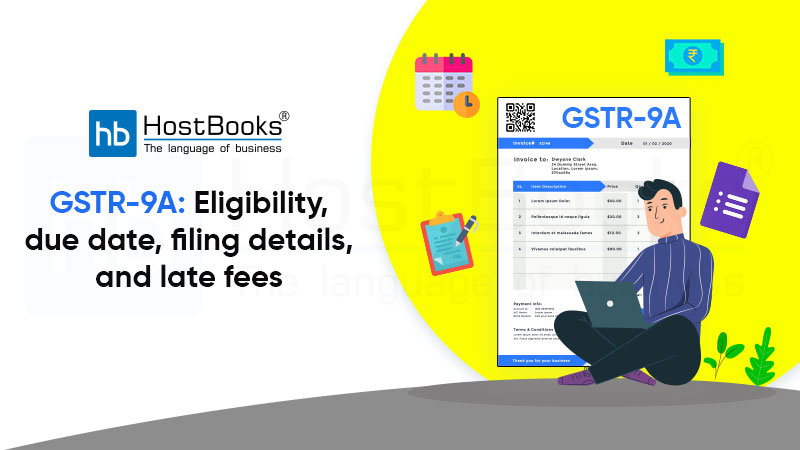GSTR-9A: Eligibility, Due Date, Filing Details, and Late Fees

The Goods and Services Tax regime came up with a variety of returns to be filed by the registered person. One of the important returns that the registered person should not miss out on is the Annual Return: GSTR-9A. The majority of the traders or businesses registered under GST are alleged to file these returns. Here during this blog post, we’ll discuss what GSTR-9A is all about alongside the eligibility, due date, the format prescribed, and therefore the penalty that’s to be paid just at the time of failure of the return filing.
Take a quick look at the content provided:
- What is GSTR-9A?
- Who should file GSTR-9A?
- Who should not file GSTR-9A?
- Due date of filing GSTR-9A
- What is the late fee?
- Required details to be provided in GSTR-9A:
What is GSTR-9A?
The GSTR-9A is the annual return to be filed once during a year by taxpayers who have opted for the Composition Scheme under GST for a specific fiscal year. It includes all the data furnished within the quarterly returns filed by the composition taxpayers during that fiscal year. Every taxpayer registered under the composition scheme must file an annual return in form GSTR 9A alongside quarterly returns in form GSTR 4.
Who should file GSTR-9A?
All the taxpayers registered under the composition scheme (As per Section 10 of CGST Act, 2017) under GST should file GSTR-9A.
Who should not file GSTR-9A?
However, the subsequent persons don’t seem to be required to file this:
- Non-resident taxable persons
- Input service distributor
- Casual Taxable Person
- Taxpayers who pay TDS under section 51 of the Act
- E-commerce operators who pay TCS under section 52 of the Act.
What is the due date for filing GSTR-9?
Due Date of Filing GSTR 9A:
The maturity to file GSTR 9A is on or before New Year’s Eve succeeding the close of a specific fiscal year that the return must be filed. As an example, Mr. Kapoor may be a composition taxpayer who must file his annual return for the fiscal year 2017-18. Thus, Mr. Kapoor must file his annual return in form GSTR 9A on or before due date. However, this date is often extended by a notification issued by CGST.
What is the late fee?
The late fee for not GSTR late filing the GSTR-9A within the due date is Rs 100 per day, per act. Which means late fees of Rs 100 under CGST and Rs 100 under SGST are going to be applicable just in case of delay.
Thus, the overall legal responsibility is Rs 200 consistent with the day of default. This may be challenged to a maximum of 0.25% of the registered person turnover in the applicable state or union territory. However, there may be no late fee charge on IGST.
Note: Use GST return late fee calculator to calculate late fees online.
Required details to be provided in GSTR-9A:
| 1 | Part-I | Basic Details including GSTIN, Legal Name, Trade Name of the registered person this is auto-populated |
| 2 | Part-II | Details of outward and inward supply declared in GSTR-4 (Quarterly) filed during the financial year and details of inward supply during the financial year. |
| 3 | Part-III | Details of tax paid as declared in returns filed (GSTR-4) at quarterly basis during the financial year. Tax paid heads including IGST, CGST, SGST, Cess, Interest, Late Fee, and Penalty must be noted here. |
| four | Part-IV | Particulars of the transactions for the preceding FY declared in returns of April to September of current FY or up to date of filing annual return of previous FY whichever is earlier. This segment includes precis of amendments or corrections regarding entries of preceding FY. It can be additions or omissions. |
| 5 | Part-V | Other Information including the subsequent given below |
| Particulars of Demands and Refunds. Here, information on any needs for tax from the tax department, tax paid at the call for raise, and stability to be paid will be noted. Also, information of Refund claimed, refund obtained out of the claim, pending refund will be noted. | ||
| Details of credit reversed or availed – If a taxpayer switch from normal to composition scheme or vice versa, ITC will be reversed or availed respectively. Such information referring to ITC will be entered here. | ||
| Late fee payable and paid – Late fee resulting from the return not filed on time (Due date). |
It is important that true and proper information is disclosed within the annual return. The information declared within the annual return would be the start line of assessment of the taxpayer by the Department. The annual return additionally serves as a beneficial cause of rectifying errors dedicated to the time of submitting GSTR-4. All information disclosed in GSTR-9A needs to be cross-checked with the books of accounts and also the Form GSTR-4 filed for the amount.

Try HostBooks
SuperApp Today
Create a free account to get access and start
creating something amazing right now!
















